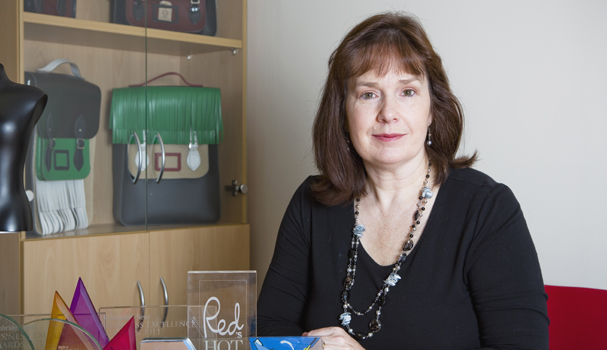“Fashion was never really my thing,” admits Julie Deane, founder of Cambridge Satchel Company. “I always liked a classic look – I’m not a crazy out-there fashionista type of person.” Yet, last year Deane was named as one of the fashion elite after making it on to the highly prestigious Drapers’ Power List, and her bags have been coveted by TV presenters, models and actresses alike – on both sides of the Atlantic.
Deane didn’t exactly follow the career trajectory of your average fashionista, either. Growing up as an only child in Llanelli, on the south-west coast of Wales, Deane buried her head in books to achieve her ultimate goal of securing a place at an Oxbridge university. She passed her A-levels with flying colours – a year ahead of schedule, no less – and took her place at Gonville and Caius College, the University of Cambridge, in 1983 to read natural sciences.
While Deane tried to immerse herself into academic life, there was trouble brewing back home. Her father was seriously ill, and in her first year of university he underwent a triple heart bypass. She left two years later with a second class degree – a disappointment the ever-ambitious Deane attributes to the stress of her father’s illness.
A glittering career in consultancy beckoned and Deane worked at Deloitte, initially in Swansea to stay close to her parents. A stint in the US followed after Deane met her husband, an American, on his inaugural European visit. “I was worried afterwards when he went on business trips and always said to him, ‘On your first business trip outside of the US, you found a wife. You’ve got to stop that habit,’” she laughs.
Despite enjoying her career and carving out friendships in Rockford, near Chicago, Deane missed the motherland. Her father’s health continued to deteriorate and after two years the couple returned to the UK. “It was very difficult and I did get incredibly homesick. That’s why we ended up coming back. Every time I’d phone, if nobody answered the phone I wouldn’t just assume they’d gone out to supermarket or something. I’d think something was wrong with my dad. And I was so far away that I didn’t know what was going on. It was too much of a strain.”

Deane and husband Kevin began looking for jobs in the UK and, to her delight, Deane saw a role advertised at Gonville and Caius, her college at Cambridge. “It was establishing the development office, setting up alumni relations and also a college appeal,” she explains.
Much to her surprise, she was offered the job, and the couple relocated back to Cambridge.
Deane got stuck in immediately: initiating an entirely new function meant she was able to flex both her creative and entrepreneurial muscles. She had to devise innovative ways of raising money for the college and one scheme involved making casts of the gargoyles at the college that were then sold as garden ornaments and book-ends.
After five years at the university, Deane became pregnant with her daughter, Emily, who is now 14, and she took the decision to be a full-time mum. Emily was followed by Max, now 11, three years later, and Deane looks back on her children’s formative years with a great amount of affection. As the children became older and increasingly independent, Deane began considering going back to work. “But I didn’t have a deadline at all, so it wasn’t something I immediately pursued or did anything about,” she says. But then she was given the impetus she needed when she discovered Emily was being bullied.
“There had been a situation at school where she hadn’t known who the characters in Eastenders were because we don’t watch much TV. Or, because, as a family, we enjoy gardening, and she’d talk about it at school. They were just stupid things but they made her a little bit different and these girls picked up on this.”
The situation came to a head after a particularly aggressive encounter with the bullies. “She had been chased until she fell over and then she had been kicked on the floor by a group of children,” Deane recalls. “She hadn’t fought back, and she hadn’t done anything about it because she was frightened it would make things worse.”
For Deane, this was the point of no return. She informed her daughter she wouldn’t return to that school after the summer holidays and found a local private school she felt would suit Emily perfectly. But that meant she would need to find two sets of school fees. “I couldn’t send her and not Max because if you’ve got children you treat them all the same and give them the same chances and opportunities.”

Procuring £24,000 a year for tuition fees was going to be no mean feat, so Deane drew up a list entitled ‘Things Julie can do to make school fees’. She had her incentive at last. One of the items on the list was selling school satchels. “I had tried to find satchels about four or five months before that when it was a birthday time, because I don’t like things that wear out, look shabby or have some kind of motif on them,” she explains. “I don’t like the whole faddy thing.”
The style of the satchel also coincided well with the huge popularity of Harry Potter, so Deane felt she would have a captive audience. She located a factory in the north of England which had been a one-time manufacturer of satchels, but the owner had become convinced that they were no longer popular items. Deane put it an order for just three as she was working to a very strict budget of £600 – the fee she’d earned organising a medical conference. Once the first three ‘perfect’ satchels arrived, Deane snapped her children using the bags, and used the photographs on marketing material.
But Deane realised she would have to reach a larger audience if she were to make a big success of the company – and most importantly, raise enough money for fees. She would have to flog her satchels online. “I’d never built a website, but now it’s so easy. You can buy all of these templates to help, though I don’t think they existed when I started five years ago.”
Once more, the aspiring entrepreneur buried her head in the books and completed a free Microsoft course on website building over the course of two evenings. On the third, once the children were tucked up in bed, she set to building the website.
And so it began. Orders started to trickle through but Deane continued to run the business from her kitchen table with the aid of her beloved mother. “Any time there was a new colour or a new size, we’d take the product shots with my mum holding a white sheet on a garden table outside,” she smiles.
“Then I’d go inside and crop out the background and replace it with a completely white background, and then load it up on to the website.”
Deane’s relationship with her mother, Freda, has been fundamental to the business’s success, she says. “From the start, when I was making my list of ten things, my mum said, ‘I don’t have the money for school fees but I’m fit and healthy and I’ll work on this every single day to make sure it succeeds and do whatever needs to be done.’”
And she’s been true to her word. Every day of the week, despite her advancing years, Deane’s mother is at Cambridge Satchel Company mucking in, turning her hand to various tasks.
It’s only right, therefore, that Freda has been able to share in the company’s success. When Deane was invited to Downing Street for tea with Samantha Cameron (as part of a prize for winning the accolade of becoming one of Red magazine’s Red Hot Women of the Year in 2011), her mother was the obvious candidate to accompany her. “And she’ll be coming with me to Buckingham Palace to get our Queen’s Award this summer, too,” beams Deane.

There is no doubting Deane and Freda’s remarkable work ethic has got the business to where it is today. Now a veritable empire, the business has over 90 employees and turns over more than £1m a month. The company opened its first brick and mortar store in Covent Garden in February this year, with another planned this summer. In order to keep pace with demand, 900 bags are made every day of the week for Cambridge Satchel Company, either within its own Leicester-based factory, or at one of the five other UK manufacturers Deane continues to outsource to.
Deane believes it’s very important to support UK manufacturing – even if her patience has been truly tested in the past. Last year, Cambridge Satchel Company (CSC) finally settled a long-running dispute with a former manufacturer after Deane discovered its directors had stolen designs, and even material, from CSC and begun making its own bags.
“We unearthed the ultimate in rotten apples when we came across that company,” said Deane. “It shook me and it shook everybody in the business because we didn’t think this man was any different from the others who we had worked with. There were no telltale signs, there were no warning lights.”
The case was eventually settled out of court, which came as an enormous relief to the entrepreneur, who struggled to come to terms with what had happened. Still, the old adage about silver linings rang true here, too: having once worked with partners on the basis of a handshake, Cambridge Satchel Company now has absolutely watertight agreements in place with all of the factories it works with to ensure the same cannot happen again.
Yet, this is one instance where the proverb ’imitation is the greatest form of flattery’ doesn’t stand up. Deane is constantly battling against the rising tide of rip-off satchel companies. “Just last week, I found out that a director of one of our manufacturers has gone off to incorporate a bag brand and has hired a former member of our trade staff.”
“It is hard,” she admits. “Maybe I just expect people to be more honest and ethical than they really are.”
It’s not just the imitation bag businesses that have sprung up in CSC’s wake, either. There are also other dodgy websites claiming to be selling satchels that pop up for a few months, and then disappear before fulfilling orders – leaving behind angry, bagless consumers. “Last September, there were 311 fake Cambridge Satchel Company websites on the internet,” Deane says, stoically.
And the entrepreneur is taking a stand. CSC has teamed up with US technology provider MarkMonitor to take down these fake websites. “I don’t want people who are looking for the real thing to fall foul of some fraudulent website,” she says. Not that policing the internet should necessarily be her job.
“The internet needs proper policing. They wouldn’t let a shop open up on Oxford Street and call itself Gucci and sell Gucci knock-offs. That’s not something they’d allow to happen. But on the internet people can do it so easily.”
Still, Deane remains steadfast in her belief in the power of the brand. It’s certainly true that CSC loyal followers – fashion bloggers, editors and the like – have remained unwaveringly by the side of the company that Deane conjured from her kitchen table. Her bags are now sold in 120 countries and are stocked by the global retailing elite, including Bloomingdales in New York, Harvey Nichols in Dubai, and Harrods and Selfridges in London.

Deane says consumers have an affinity with the brand. This was, of course, helped by the Google Chrome advert that first aired on TV during last year’s X-Factor. “They did such an amazing job,” she gushes. “Cambridge Satchels is like my third child; it just means so much to me and I couldn’t see any of what the advert was going to look like until a week before it actually aired.
“I’d go and talk to them about the brand and they came to the kitchen and I gave them the footage and so on. I just kept thinking, ‘I really hope they get it’. Because we’re not a big corporate, and it’s a story with so much heart.”
She was not disappointed. “When I actually saw the advert, I was sitting there with Jeff, who works in our office, and both of us had tears running down our faces. Bartle Bogle Hegarty, the advertising agency behind it, totally got it.”
The Google Chrome advert certainly signalled a seachange in Cambridge Satchel Company’s fortunes. With the court case behind them, Deane could look forward to a brighter and bag-filled future. But it’s not always been easy, she says. “There are so many points at which it would have been easier to give up. It’s not the very smooth, exciting, easy ride it looks in our one-minute Google Chrome advert.”
“There have been huge struggles along the way,” she says. “But it’s not about what bad things happen to you, it’s how you bounce back from those things. It’s like the darkness before the dawn: when things go a bit pear-shaped, you have to find the grit to work through it, because there will be something fantastic waiting for you.” ![]()
Share via:








































